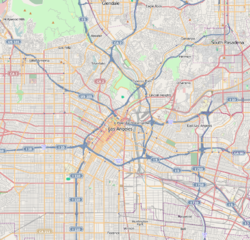Boyle Heights, Los Angeles, California
| Boyle Heights | |
|---|---|
| Neighborhood of Los Angeles | |

Breed Street Shul
|
|
 Boundaries of Boyle Heights as drawn by the Los Angeles Times |
|
| Location within Los Angeles | |
| Coordinates: 34°02′02″N 118°12′16″W / 34.03389°N 118.20444°W | |
| Government | |
| • City Council | José Huizar (D) |
| • State Assembly | John Pérez (D) |
| • State Senate | Kevin de León (D) |
| • U.S. House | Xavier Becerra (D) |
| Area | |
| • Total | 17 km2 (6.5 sq mi) |
| Population (2000) | |
| • Total | 92,785 |
| • Density | 5,507/km2 (14,262/sq mi) |
| ZIP Code | 90023, 90033, 90063 |
| Area code(s) | 213, 323 |
Boyle Heights is a working-class, predominantly Mexican American, neighborhood of almost 100,000 residents east of Downtown Los Angeles in the City of Los Angeles, California. The district has more than twenty public schools, and ten private schools.
Boyle Heights was called Paredon Blanco (White Bluff) when California was part of Mexico.
In the 1950s, Boyle Heights was racially and ethnically diverse, with Jews, Latinos (mainly Chicanos), various sectarian Spiritual Christians from Russia, Yugoslav (Serbian and Croatian) immigrants, Portuguese people, and Japanese Americans living in the neighborhood. Bruce Phillips, a sociologist who tracked Jewish communities across the United States, said that Jewish families left Boyle Heights not because of racism, but instead because of banks redlining the neighborhood (denying home loans) and the construction of several freeways through the community, which led to the loss of many houses.
As of the 2000 census, there were 92,785 people in the neighborhood, which was considered "not especially diverse" ethnically, with the racial composition of the neighborhood at 94.0% Latino, 2.3% Asian, 2.0% White (non-Hispanic), 0.9% African American, and 0.8% other races. The median household income was $33,235, low in comparison to the rest of the city. The neighborhood's population was also one of the youngest in the city, with a median age of just 25.
As of 2011, 95% of the community was Hispanic and Latino. The community had Mexican Americans, Mexican immigrants, and Central American ethnic residents. Hector Tobar of the Los Angeles Times said, "The diversity that exists in Boyle Heights today is exclusively Latino".
...
Wikipedia

